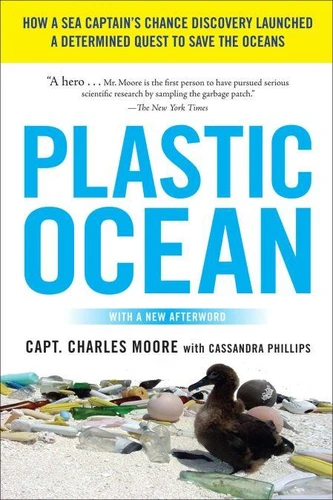Plastic Ocean. How a Sea Captain's Chance Discovery Launched a Determined Quest to Save the Oceans
Par :Formats :
Disponible dans votre compte client Decitre ou Furet du Nord dès validation de votre commande. Le format ePub protégé est :
- Compatible avec une lecture sur My Vivlio (smartphone, tablette, ordinateur)
- Compatible avec une lecture sur liseuses Vivlio
- Pour les liseuses autres que Vivlio, vous devez utiliser le logiciel Adobe Digital Edition. Non compatible avec la lecture sur les liseuses Kindle, Remarkable et Sony
- Non compatible avec un achat hors France métropolitaine
 , qui est-ce ?
, qui est-ce ?Notre partenaire de plateforme de lecture numérique où vous retrouverez l'ensemble de vos ebooks gratuitement
Pour en savoir plus sur nos ebooks, consultez notre aide en ligne ici
- Nombre de pages368
- FormatePub
- ISBN978-1-101-51778-9
- EAN9781101517789
- Date de parution27/10/2011
- Protection num.Adobe DRM
- Taille2 Mo
- Infos supplémentairesepub
- ÉditeurAvery
Résumé
The researcher who discovered the Great Pacific Garbage Patch-and remains one of today's key advocates for plastic pollution awareness-inspires a fundamental rethinking of the modern Plastic Age. In 1997, environmentalist Charles Moore discovered the world's largest collection of floating trash-the Great Pacific Garbage Patch ("GPGP")-while sailing from Hawaii to California. Moore was shocked by the level of pollution that he saw.
And in the last 20 years, it's only gotten worse-a 2018 study has found that the vast dump of plastic waste swirling in the Pacific Ocean is now bigger than France, Germany, and Spain combined-far larger than previously feared. In Plastic Ocean, Moore recounts his ominous findings and unveils the secret life of plastics. From milk jugs and abandoned fishing gear to polymer molecules small enough to penetrate human skin and be unknowingly inhaled, plastic is now suspected of contributing to a host of ailments, including infertility, autism, thyroid dysfunction, and certain cancers.
An urgent call to action, Plastic Ocean's sobering revalations have been embraced by activists, concerned parents, and anyone alarmed by the deadly impact and implications of this man-made environmental catastrophe.
And in the last 20 years, it's only gotten worse-a 2018 study has found that the vast dump of plastic waste swirling in the Pacific Ocean is now bigger than France, Germany, and Spain combined-far larger than previously feared. In Plastic Ocean, Moore recounts his ominous findings and unveils the secret life of plastics. From milk jugs and abandoned fishing gear to polymer molecules small enough to penetrate human skin and be unknowingly inhaled, plastic is now suspected of contributing to a host of ailments, including infertility, autism, thyroid dysfunction, and certain cancers.
An urgent call to action, Plastic Ocean's sobering revalations have been embraced by activists, concerned parents, and anyone alarmed by the deadly impact and implications of this man-made environmental catastrophe.
The researcher who discovered the Great Pacific Garbage Patch-and remains one of today's key advocates for plastic pollution awareness-inspires a fundamental rethinking of the modern Plastic Age. In 1997, environmentalist Charles Moore discovered the world's largest collection of floating trash-the Great Pacific Garbage Patch ("GPGP")-while sailing from Hawaii to California. Moore was shocked by the level of pollution that he saw.
And in the last 20 years, it's only gotten worse-a 2018 study has found that the vast dump of plastic waste swirling in the Pacific Ocean is now bigger than France, Germany, and Spain combined-far larger than previously feared. In Plastic Ocean, Moore recounts his ominous findings and unveils the secret life of plastics. From milk jugs and abandoned fishing gear to polymer molecules small enough to penetrate human skin and be unknowingly inhaled, plastic is now suspected of contributing to a host of ailments, including infertility, autism, thyroid dysfunction, and certain cancers.
An urgent call to action, Plastic Ocean's sobering revalations have been embraced by activists, concerned parents, and anyone alarmed by the deadly impact and implications of this man-made environmental catastrophe.
And in the last 20 years, it's only gotten worse-a 2018 study has found that the vast dump of plastic waste swirling in the Pacific Ocean is now bigger than France, Germany, and Spain combined-far larger than previously feared. In Plastic Ocean, Moore recounts his ominous findings and unveils the secret life of plastics. From milk jugs and abandoned fishing gear to polymer molecules small enough to penetrate human skin and be unknowingly inhaled, plastic is now suspected of contributing to a host of ailments, including infertility, autism, thyroid dysfunction, and certain cancers.
An urgent call to action, Plastic Ocean's sobering revalations have been embraced by activists, concerned parents, and anyone alarmed by the deadly impact and implications of this man-made environmental catastrophe.









